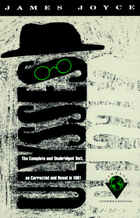Ulysses by James Joyce (1934) is a novel about the interaction of social responsibility and personal desires. It focuses primarily on three characters: Stephen Dedalus a self-absorbed scholar attempting to find his artistic voice, Leopold Bloom who tries to meet his social responsibilities in a culture that is not completely accepting of him, and Molly Bloom (Poldy's wife) who struggles with her feminine destiny.
The novel parallels the structure of Homer's "Odyssey" that chronicles the 10 year struggle of Odysseus to return from war in Troy to his home in Ithaca. Ulysses, the Latin translation of the Greek name Odysseus, is Leopold (Poldy) Bloom who travels the streets of Dublin one Thursday on June 16, 1904. His goal is to accomplish his daily task of meeting his family's economic needs, forming social alliances with Dubliners (including Stephen), and satisfying his own drives for understanding and fulfillment. Odysseus sought to reunite with his wife and assess her fidelity in his absence, and Bloom looks forward to the end of the day when he returns to his home at 7 Eccles Street, concerned about his wife's unfaithfulness.
"Ulysses" is remarkable in its descriptive detail of the physical and psychological environments of Dublin and its characters. The feelings related to immersion in the living Irish city are so strong that there may be some irrational fear of being unable to return to current life. The entrance into the reality of the lives of Stephen, Molly, and Poldy is uncanny as readers become physically and psychically connected to characters. It is a matter of proximity. You lose your own personality as you accompany these people when they converse, walk the streets, visit stores, drink and philosophize, reveal themselves in stream of consciousness monologues, argue, pursue bacchanalian extremes, and have private battles with loss and melancholy.
The reader `sees' everything that day, the external locations and the inner worlds of the characters, with the "ineluctable modality of the visible." This is the direct and complete experience of Joyce's art without the restriction of our own frame of reference, history, obligations, and wants. It is intimidating to realize that your own life is changing, that part of your personal history now contains a new day of your own existence - you have extended your life for a day. Many people throughout the world celebrate a second birthday on June 16 (Bloomsday).
After publication of "Ulysses," I believe that James Joyce (like a few other artists) spent the rest of his life amazed at his creation. As he lay dying in hospital waiting for his wife to return to his bedside, he had to wonder where his inspiration originated, where he summoned the ability to give the gift of another day of life to us all.
The reader can benefit most from "Ulysses" by preparing to read it. Read (re-read) Homers "Odyssey." Pay close attention to the structure, the symbolic content, and the psychology of Odysseus. Odysseus was a flawed hero, externally brave but also self-serving and blind to parts of his own personality (like Bloom). Use "Ulysses Annotated" by Don Gifford to help guide you through the detail of theology, philosophy, psychology, history, rhetoric, and the physical layout of Dublin. This reference work is very good because it allows readers to have their own experiences by providing only supplementary content (facts) that help to understand the myriad allusions presented in the text. I suggest that you enjoy the many beautiful styles of prose presented in the 18 episodes pausing to quickly glance at the definitions in your opened copy of "Ulysses Annotated." Then before reading the next episode, go back and read the complete explanatory entries in this reference book. Give yourself a couple of months to enjoy the novel and add this new day to your life.

No comments:
Post a Comment